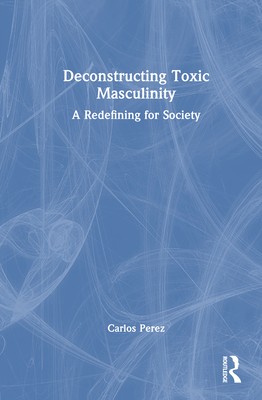
- We will send in 10–14 business days.
- Author: Carlos Pérez
- Publisher: Routledge
- ISBN-10: 1032734418
- ISBN-13: 9781032734415
- Format: 15.6 x 23.4 x 1.4 cm, kieti viršeliai
- Language: English
- SAVE -10% with code: EXTRA
Reviews
Description
This accessible book explores toxic masculinity, looking at how to define this and how we can and should challenge its spread.
The book draws on Derrida's deconstruction approach, using this philosophical lens to deconstruct what toxic masculinity means and to better understand its significance for our society. It focuses on how harmful aspects of masculinity spread, infiltrate, and intoxicate our societies and how existing structures allow aspects of harmful masculinity to become toxic. The book also features discussions and analysis of participants' lived experiences of masculinities, alongside the author's reflections. It explores the relevance of toxic masculinity in work environments, politics, relationships and gender roles, and seeks to challenge and mitigate its damages for everyone.
Encouraging critical thinking and understanding of healthier ways of being for all, this timely book will be of interest to therapists, counsellors, teachers and practitioners of family studies. It will also be useful reading for students in the fields of psychology, gender studies, sociology and related fields.
EXTRA 10 % discount with code: EXTRA
The promotion ends in 23d.04:11:24
The discount code is valid when purchasing from 10 €. Discounts do not stack.
- Author: Carlos Pérez
- Publisher: Routledge
- ISBN-10: 1032734418
- ISBN-13: 9781032734415
- Format: 15.6 x 23.4 x 1.4 cm, kieti viršeliai
- Language: English English
This accessible book explores toxic masculinity, looking at how to define this and how we can and should challenge its spread.
The book draws on Derrida's deconstruction approach, using this philosophical lens to deconstruct what toxic masculinity means and to better understand its significance for our society. It focuses on how harmful aspects of masculinity spread, infiltrate, and intoxicate our societies and how existing structures allow aspects of harmful masculinity to become toxic. The book also features discussions and analysis of participants' lived experiences of masculinities, alongside the author's reflections. It explores the relevance of toxic masculinity in work environments, politics, relationships and gender roles, and seeks to challenge and mitigate its damages for everyone.
Encouraging critical thinking and understanding of healthier ways of being for all, this timely book will be of interest to therapists, counsellors, teachers and practitioners of family studies. It will also be useful reading for students in the fields of psychology, gender studies, sociology and related fields.


Reviews